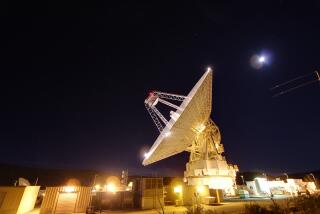Boost in AIDS Research Funding Urged : Health: Panel asks government to raise federal agency’s $804-million budget by 25%.
WASHINGTON — Concluding that more AIDS research is urgently needed, a panel of experts convened by the Institute of Medicine recommended Thursday that the National Institutes of Health receive an immediate 25% increase in federal funding for AIDS work.
In a long-awaited report evaluating the performance of the NIH during the decade-long epidemic, the panel praised the federal agency’s response to the crisis and recommended a series of measures it said could make the institutes’ AIDS programs even stronger.
NIH accomplishments in AIDS research have been “quite amazing,” said Dr. William H. Danforth, chancellor of Washington University and chairman of the Institute of Medicine panel.
“More has been learned about this disease than any disease in any comparable period in the history of the world,” Danforth said in an interview. Despite that progress, he added, “we still have a disease that’s spreading. And we don’t know enough yet to halt that spread, or to cure people. So the problem is still unsolved.”
The Institute of Medicine is part of the National Academy of Sciences, a congressionally chartered, private organization that advises the federal government on matters of science and technology. It generally wields considerable influence with policy-makers.
The report’s recommendations were applauded by AIDS groups and others.
“When we saw a crisis (in the Persian Gulf) we dealt with it, and cost was not the issue,” said Dr. Mervyn F. Silverman, president of the American Foundation for AIDS Research. “We have a war in the United States right now, but all we hear about is how much it’s costing.”
The panel called for a 25% increase in the National Institutes of Health AIDS research budget, which totals $804 million this year. President Bush has proposed $851 million in funding for the 1992 fiscal year, an increase of 6%.
The report by the Institute of Medicine’s panel said the additional funds are needed to ensure support for the “most promising” basic science opportunities and to expand currently underdeveloped areas of AIDS research.
The report did not propose a source of the new funds, although it said the money should not be shifted from other NIH programs.
“We think the investment is a good investment,” Danforth said. “We think that sort of money could be put to very good use.”
Dr. Anthony Fauci, NIH director of AIDS activities, agreed that the institutes could use the extra money. He said he requested nearly $1.2 billion for 1992.
The additional funds, Fauci said, are “clearly scientifically justifiable.”
The panel suggested that the NIH director be given a discretionary fund of at least $20 million along with the authority to transfer up to 1% of each NIH appropriation to enhance the agency’s ability to respond to future emergencies or research opportunities.
These funds could be used to “exploit important scientific breakthroughs arising in AIDS or non-AIDS research that could not be anticipated in the regular budget process or to address major epidemics or other public health problems that suddenly emerge,” the report said.
AIDS programs account for about 10% of the entire NIH budget.
The report “confirms many of the suggestions that AIDS activists have been making for several years,” said David Barr, assistant director of policy for the New York-based Gay Men’s Health Crisis. “The report sends a loud and clear message to the Congress that AIDS . . . must be met with more research dollars.”
Daniel T. Bross, executive director of the AIDS Action Council, said he hoped the NIH, the Bush Administration and Congress would “heed (the report’s) sensible recommendations, particularly for increased funding, systemic planning and stronger management of existing programs.”
Sen. Edward M. Kennedy (D-Mass.), chairman of the Senate Labor and Human Resources Committee, agreed that it was “essential to do more to streamline our AIDS research system.”
More to Read
Sign up for Essential California
The most important California stories and recommendations in your inbox every morning.
You may occasionally receive promotional content from the Los Angeles Times.










